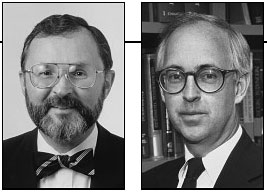New deanships will augment the DMS administrative lineup
Two new deanships were recently created to address changes at DMS and in the medical world generally, as well as to provide support to Dean John Baldwin, M.D. Two longtime members of the faculty are settling into their new roles—William Hickey, M.D., as senior associate dean for academic affairs and David Roberts, M.D., as senior associate dean for clinical affairs.
Philosophy: Hickey brings a breadth of experience to his new position, with degrees in philosophy, engineering, and medicine. This is fortunate because, as he explains, "it's a very heterogeneous position. It entails issues relating to students—student performance, curriculum evaluation to some extent; it involves recruitment not only of students but of faculty; retention of faculty." He also works on tenure and performance reviews and interacts with the Dartmouth College administration and with DMS's assistant deans. And, he concludes, "one of the most basic things is providing support for the dean of the Medical School." Hickey often acts as a surrogate for Dean Baldwin when he is out of town or otherwise occupied.

|
|
Pathologist William Hickey, left, and neurosurgeon David Roberts, right, have added new roles in the deanery to their other responsibilities. |
"There is certainly a need for a lot more philosophy in this particular position than there is in a discipline such as pathology," Hickey comments. He came to Dartmouth in 1992 as chair of pathology after four years at Washington University in St. Louis and seven at the University of Pennsylvania. He reports that he was happy to exchange the department chair for the new position. "I do like a change occasionally," Hickey says. "I had been the chair of the pathology department at Dartmouth longer than I had done absolutely anything else in my life."
But some things haven't changed in Hickey's life. He's continuing his research into the mechanisms that allow inflammation to develop in the nervous system. And he's still teaching neuroscience, cardiac pathology, and neuropathology. "What has changed," Hickey declares, "is that the administration that I engage in during the day, the type of meetings that I attend, the focus of my administrative time, is now across the Medical School."
This new perspective has given Hickey some insights. First, he's impressed by the dedication of the faculty. "There's a real concern for students. Everybody [puts] a lot of time and effort and true concern into the education of students." He's also noticed the dramatic growth in the institution. "We could see very readily that our department was growing," he says, "but . . . the growth is pervasive."
Aspirations: Focusing on the clinical aspects of that growth will be David Roberts. A 1975 graduate of DMS, he has been on the faculty for 18 years and chief of neurosurgery since 1997.
"[Faculty] come here with academic aspirations and all the right motives to increase our fund of knowledge," explains Roberts, but "the many pressures of clinical practice push the academic mission to the background." He expects to be an advocate for the academic goals of clinicians and to strengthen the sense of connection between the clinical faculty and the Medical School.
Roberts plans to work in several areas to accomplish his mandate. He will participate in the process of programmatic decision- making. "Part of my role is going to be to articulate and champion the academic cause in those discussions. There are positions that might be approved and programs that might be funded that don't have an obvious bottom-line guarantee in the short term. . . . There's a need to remember that we're an academic institution." He also foresees playing a role in recruiting faculty who will improve the caliber of the institution as a whole.
But the position is so new that he isn't exactly sure how it will develop. At the moment, he is still trying to make time for his new administrative role—exactly the process he hopes to make easier for others. He plans to cut down on his surgical and clinic time, while maintaining his current role in the education of medical students and residents. He certainly understands the clinician's dilemma. "There aren't enough hours in the day," he admits.
Though he's cutting back, Roberts still loves practicing. He says that neurosurgery combines the fascination of studying the "black box of the brain and mind" with the satisfaction of being able to help people. "The fact that it's coupled with a mechanical side," he adds, "is icing on the cake."
Collaboration: Though their focuses are different, Roberts and Hickey anticipate working closely together. Hickey points out that he plays a role in the career development of the clinical faculty by helping them establish research projects and advising them on requirements for professional advancement. And Roberts expects to provide clinical input into the basic science side of education. "I'm really excited about that," he says.
Jonathan Weisberg
If you would like to offer any feedback about this article, we would welcome getting your comments at DartMed@Dartmouth.edu.
